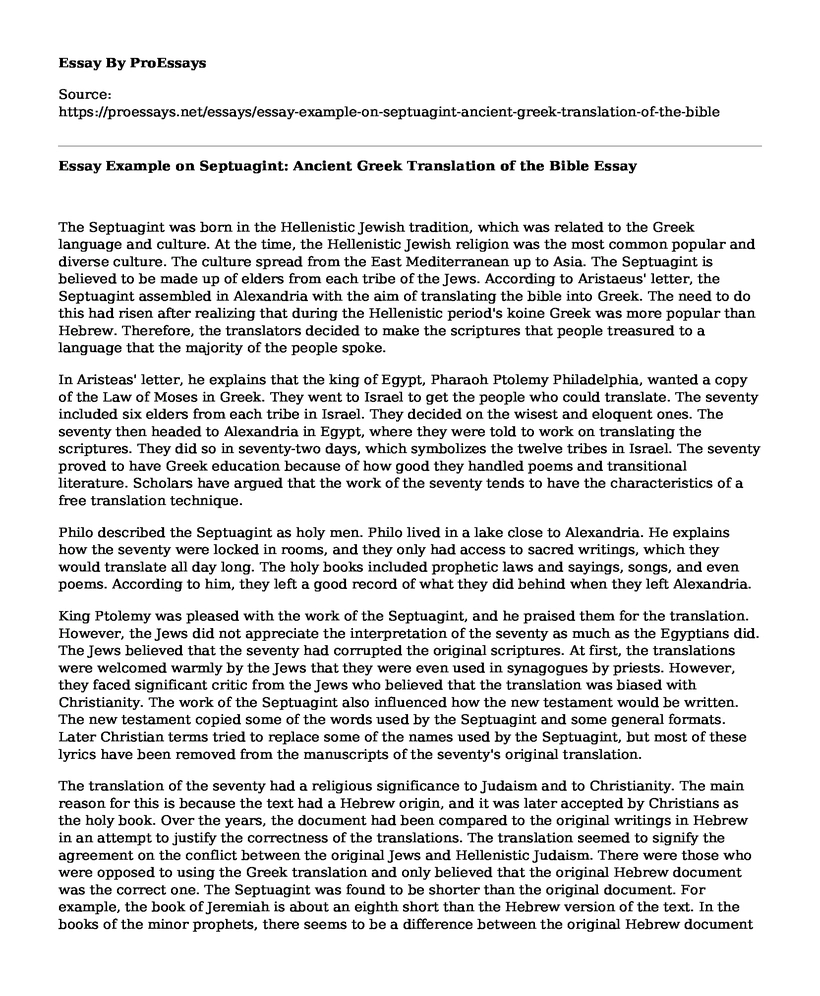The Septuagint was born in the Hellenistic Jewish tradition, which was related to the Greek language and culture. At the time, the Hellenistic Jewish religion was the most common popular and diverse culture. The culture spread from the East Mediterranean up to Asia. The Septuagint is believed to be made up of elders from each tribe of the Jews. According to Aristaeus' letter, the Septuagint assembled in Alexandria with the aim of translating the bible into Greek. The need to do this had risen after realizing that during the Hellenistic period's koine Greek was more popular than Hebrew. Therefore, the translators decided to make the scriptures that people treasured to a language that the majority of the people spoke.
In Aristeas' letter, he explains that the king of Egypt, Pharaoh Ptolemy Philadelphia, wanted a copy of the Law of Moses in Greek. They went to Israel to get the people who could translate. The seventy included six elders from each tribe in Israel. They decided on the wisest and eloquent ones. The seventy then headed to Alexandria in Egypt, where they were told to work on translating the scriptures. They did so in seventy-two days, which symbolizes the twelve tribes in Israel. The seventy proved to have Greek education because of how good they handled poems and transitional literature. Scholars have argued that the work of the seventy tends to have the characteristics of a free translation technique.
Philo described the Septuagint as holy men. Philo lived in a lake close to Alexandria. He explains how the seventy were locked in rooms, and they only had access to sacred writings, which they would translate all day long. The holy books included prophetic laws and sayings, songs, and even poems. According to him, they left a good record of what they did behind when they left Alexandria.
King Ptolemy was pleased with the work of the Septuagint, and he praised them for the translation. However, the Jews did not appreciate the interpretation of the seventy as much as the Egyptians did. The Jews believed that the seventy had corrupted the original scriptures. At first, the translations were welcomed warmly by the Jews that they were even used in synagogues by priests. However, they faced significant critic from the Jews who believed that the translation was biased with Christianity. The work of the Septuagint also influenced how the new testament would be written. The new testament copied some of the words used by the Septuagint and some general formats. Later Christian terms tried to replace some of the names used by the Septuagint, but most of these lyrics have been removed from the manuscripts of the seventy's original translation.
The translation of the seventy had a religious significance to Judaism and to Christianity. The main reason for this is because the text had a Hebrew origin, and it was later accepted by Christians as the holy book. Over the years, the document had been compared to the original writings in Hebrew in an attempt to justify the correctness of the translations. The translation seemed to signify the agreement on the conflict between the original Jews and Hellenistic Judaism. There were those who were opposed to using the Greek translation and only believed that the original Hebrew document was the correct one. The Septuagint was found to be shorter than the original document. For example, the book of Jeremiah is about an eighth short than the Hebrew version of the text. In the books of the minor prophets, there seems to be a difference between the original Hebrew document and the translation from the seventy.
Although the seventy received a lot of rejection from the Jews, their work will remain to be the original translation of the Hebrew Bible into Greek. They did what many did not dare to do. They broke the barriers of the difference in the culture of the Jews people. They not only translated the old testament but also their wok helped in developing the new testament.
References
Salvesen, A. (2003). Review: The Septuagint as Christian Scripture. Its Prehistory and the Problem of its Canon. The Journal of Theological Studies. 54. 10.1093/jts/54.2.631.Retrived from http://khazarzar.skeptik.net/books/hengel01.pdf
Cite this page
Essay Example on Septuagint: Ancient Greek Translation of the Bible. (2023, May 08). Retrieved from https://proessays.net/essays/essay-example-on-septuagint-ancient-greek-translation-of-the-bible
If you are the original author of this essay and no longer wish to have it published on the ProEssays website, please click below to request its removal:
- Critical Essay on Brave New World: Narrative From John's Point of View
- The European by Hermann Hesse Essay Example
- Literary Analysis Essay on Twain Adventures of Huckleberry Finn: Huck Finn and Jim's Relationship
- Compare and Contrast Essay on Death of Salesman and Fences
- Christianity as a Tool for Oppression in Brown's Clotel or The President's Daughter
- Slaves Mishandled: Inhumane Treatment and Unbearable Suffering - Essay Sample
- Essay Example on Sonnet XX: A Young Man's Dual Nature and Character







